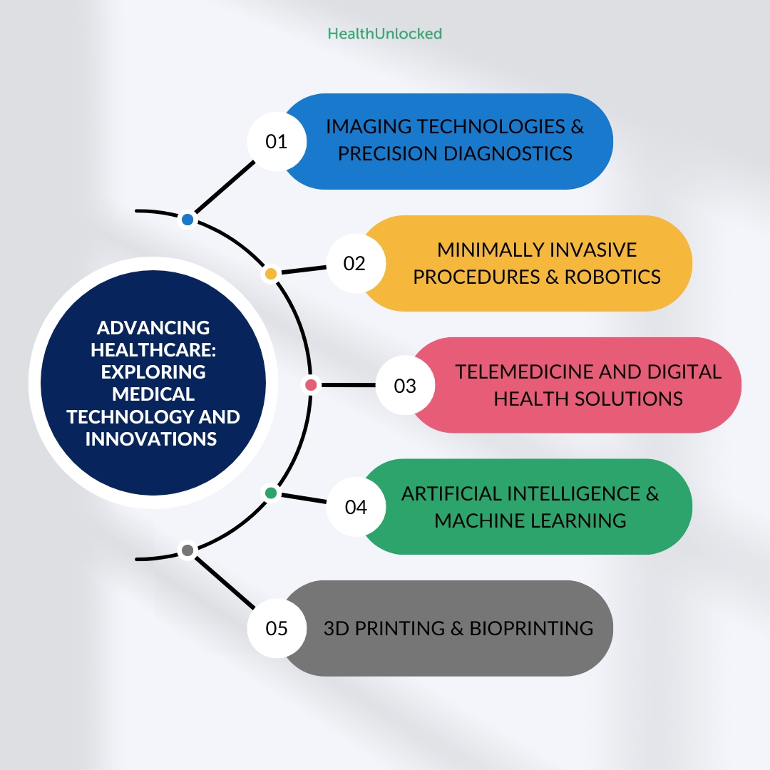We hope you have enjoyed this mini series where we took a deep dive into 5 areas that have seen advancements in health and well-being research over the past year (click here to see the origina post: healthunlocked.com/blog/pos....
To round-up the series, today we delve into the realm of medical technology and innovations, exploring their impact and potential in shaping the future of healthcare. From cutting-edge devices to groundbreaking software solutions, these advancements are enhancing diagnostics, improving treatments, and transforming patient care.
Imaging Technologies and Precision Diagnostics:
Medical imaging technologies have made significant strides, enabling more accurate and detailed diagnoses. Advanced imaging modalities, such as magnetic resonance imaging (MRI), computed tomography (CT), and positron emission tomography (PET), offer high-resolution images that aid in the detection and characterization of diseases. Additionally, emerging technologies like molecular imaging and hybrid imaging techniques provide insights into the cellular and molecular processes, facilitating early disease detection and precise diagnostics.
Minimally Invasive Procedures and Robotics:
Minimally invasive procedures have gained popularity due to their numerous benefits, including reduced scarring, shorter recovery times, and improved patient outcomes. Innovations in surgical techniques, such as laparoscopy and robotic-assisted surgery, have transformed the field of surgery. Robotic systems offer enhanced dexterity, precision, and visualization, allowing surgeons to perform complex procedures with greater accuracy and control. These advancements minimize invasiveness, optimize surgical outcomes, and improve patient satisfaction.
Telemedicine and Digital Health Solutions:
The rise of telemedicine and digital health solutions has dramatically impacted healthcare accessibility and delivery. Telemedicine enables remote consultations, allowing patients to connect with healthcare professionals from the comfort of their homes. It improves access to care, particularly for individuals in remote or underserved areas. Digital health solutions encompass a wide range of technologies, including mobile apps, wearable devices, and remote monitoring systems. These innovations empower individuals to actively participate in their own health management, providing real-time data, personalized insights, and self-monitoring capabilities.
Artificial Intelligence and Machine Learning:
Artificial intelligence (AI) and machine learning (ML) have emerged as transformative tools in healthcare. AI algorithms can analyze vast amounts of medical data, identify patterns, and make predictions, aiding in diagnosis, treatment planning, and patient management. ML algorithms enable personalized treatment approaches, risk prediction, and decision support systems. AI-driven technologies, such as natural language processing and chatbots, streamline administrative tasks, improve patient communication, and enhance workflow efficiency.
3D Printing and Bioprinting:
3D printing technology has found its application in the medical field, revolutionizing the production of personalized implants, prosthetics, and anatomical models. It enables precise customization, faster prototyping, and cost-effective production. Bioprinting, a specialized form of 3D printing, has the potential to fabricate living tissues and organs, offering hope for future transplantation and regenerative medicine. These advancements hold the potential to address organ shortages and improve patient outcomes.
Medical technology and innovations continue to push the boundaries of healthcare, transforming diagnostics, treatments, and patient care. Imaging technologies, minimally invasive procedures, telemedicine, AI-driven solutions, 3D printing, and bioprinting are just a few examples of the remarkable advancements revolutionizing the field. As we embrace these innovations, it is crucial to ensure ethical implementation, prioritize patient safety and privacy, and foster collaboration between healthcare professionals, researchers, and technology developers. By harnessing the power of medical technology, we can propel healthcare forward, providing more precise diagnoses, personalized treatments, and improved quality of life for patients worldwide.
---
If you have enjoyed this mini series we would love to know what other topics you would be interested in! Let us know what interests you in the replies below 
